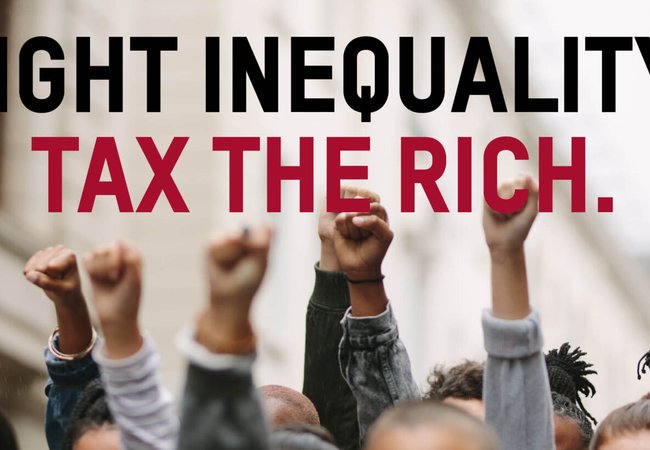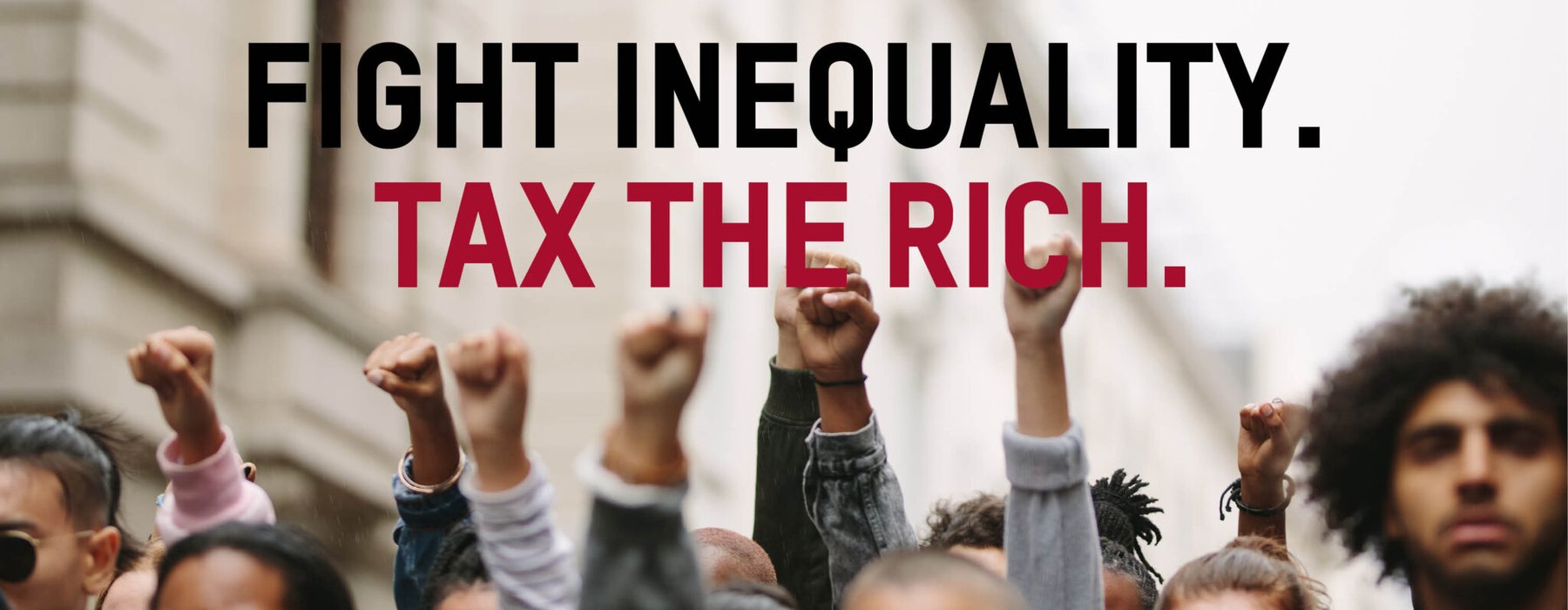


I'm Admin in the United Kingdom
16 Jan, 2023
6 mins read time
Richest 1% grab nearly twice as much new wealth as rest of the world put together

I'm Admin in the United Kingdom
16 Jan, 2023
6 mins read time
The richest 1% of people globally have pocketed $26 trillion (£21 trillion) in new wealth since 2020, nearly twice as much as the other 99 per cent of the world’s population, an Oxfam report reveals today.
Survival of the Richest highlights how extreme wealth and extreme poverty have increased simultaneously for the first time in 25 years. It shows that the 1% are getting an ever-greater share of the world’s resources despite already capturing around half of all new wealth during the past decade. In the two years up to December 2021, they grabbed almost two-thirds (63 per cent) of the $42 trillion (£34 trillion) of new wealth created.
- Extreme poverty increases as billionaires’ fortunes balloon by $2.7bn-a-day since 2020
- Richest 1% of Britons hold more wealth than 70 per cent of Britons put together
- Scotland’s 10% richest households have 217 times more wealth than the least wealthy decile
- Oxfam Scotland calls for tax reform to target wealth globally, and across UK – including Scotland
The report is published as elites gather in the Swiss ski resort of Davos for the World Economic Forum. Inequality is expected to be high on the agenda following the World Bank’s announcement last year that global progress in reducing extreme poverty has come to a halt amid what it expects to be the largest increase in global inequality since World War II.
Oxfam’s report shows that, in the last two years, for every $1 of new global wealth earned by a person in the bottom 90 per cent, each billionaire gained roughly $1.7 million (£1.4 billion). The combined fortune of billionaires has increased by a staggering $2.7 billion (£2 billion) a day. This comes on top of a decade of historic gains – both the number and wealth of billionaires having doubled over the last ten years.
At the same time, at least 1.7 billion workers live in countries where inflation is outpacing wages, roughly one in ten people face hunger, and the climate crisis deepens.
Oxfam is calling for a wide-ranging increase in taxation of the super-rich to claw back crisis gains driven by public money and profiteering.
While Oxfam’s report is global and focused on the most extreme wealth inequality, the wealth gap is vast across the UK and in Scotland too. Oxfam’s analysis found that the richest 1% of Britons hold more wealth than 70 per cent of Britons, while the four richest Britons have more wealth than 20 million Britons.
In Scotland, the Scottish Government has embedded its commitment to share wealth more evenly as a National Outcome and created a Poverty and Inequality Commission to propose solutions. Yet there has been barely any progress to cut wealth inequality in Scotland since 2006, with most recent data suggesting the richest 10 per cent of households have 217 times more wealth than the least wealthy 10 per cent.
Even before the COVID-19 pandemic and the cost-of-living crisis, nearly one in five people in Scotland were in poverty, with much higher rates for particular groups, including single women with children.
Jamie Livingstone, Head of Oxfam Scotland, said: “Globally, extreme poverty is increasing for the first time in 25 years and close to a billion people are going hungry. Yet, for billionaires, every day is a bonanza. Governments everywhere cannot standby and leave people to face the injustice of poverty when they could take action to share wealth much more evenly.
“In Scotland, just as across the UK, wealth inequality is stark. It’s long past time for the UK and Scottish Governments to better tax wealth and then use these revenues to tackle poverty and the climate crisis.”
Seventeen-year-old Teigan is a young carer who lives in the Central Belt of Scotland. She juggles school and a part-time job with helping to care for her younger brother, who has autism.
Teigan said: “Why do we always need to fight for support? It’s a constant battle trying to get funding in. We can’t go on strike; our caring role is always happening. I know that some families don’t make enough money to cover the costs of care, or the energy bills that creates, or food bills and gas that is needed. We always need to fight for everything and it shouldn’t be that way.”
Ahead of last month’s Scottish Budget, Oxfam Scotland, other anti-poverty organisations and a leading progressive think tank, called on the Scottish Government to kick-start tax reform in Scotland – including to better target wealth, as well as to make polluters pay for their damage to accelerate climate action.
While the Scottish Government has proposed some welcome Income Tax changes – including asking those on higher incomes to contribute a bit more through a one pence rise to the higher and top rates of Income Tax – it did nothing to better address wealth inequality, nor raise enough money to invest in key priorities.
Livingstone said: “Fairer tax, particularly of wealth and carbon, is essential to tackle economic inequality and raise significant revenue to address poverty, invest in undervalued care, and to confront the climate crisis. The UK Government should use its substantial reserved powers to tackle extreme economic inequality, but the Scottish Government should not wait: a failure to kick start meaningful tax reform in Scotland is a choice.”
According to the Fight Inequality Alliance, Institute for Policy Studies, Oxfam and the Patriotic Millionaires, an annual global wealth tax of up to five per cent on the world’s millionaires and billionaires could raise $1.7 trillion a year (£1.4 trillion) – enough to deliver transformative action, including lifting two billion people out of poverty.
Ian Gregg, former managing director of Greggs and the son of its founder, is a supporter of Patriotic Millionaires UK and Tax Justice Network, who are campaigning for a wealth tax in the UK. He said: “I can never be happy with an economy that fosters such division in society for our children and grandchildren. Now, more than ever, the wealthiest must contribute more. For me, paying more tax would be a small price to pay to start the process of making society fairer, and reducing inequalities in both wealth and opportunity.”
Oxfam’s report shows that taxes on the wealthiest used to be much higher. Over the last forty years, governments across Africa, Asia, Europe, and the Americas have slashed income tax on the richest while upping taxes on goods and services, disproportionately hitting those on low incomes and exacerbating gender inequality. Oxfam is calling on governments to:
- Introduce one-off solidarity wealth taxes and windfall taxes to end crisis profiteering.
- Permanently increase taxes on the richest one per cent, for example to at least 60 per cent of their income from labour and capital, with higher rates for multi-millionaires and billionaires. Governments must especially raise taxes on capital gains, which are subject to lower tax rates than other forms of income.
- Tax the wealth of the richest one per cent at rates high enough to significantly cut the numbers and wealth of the richest people and redistribute these resources. This includes via inheritance, property and land taxes, as well as net wealth taxes. Also, better track the wealth of the richest people and corporations.
For more information and interviews, contact Natalie Terry, Media and Communications Advisor, on 07906139293 / nterry1@oxfam.org.uk
Notes to Editors
Oxfam’s calculations are based on the most up-to-date and comprehensive data sources available. Figures on the very richest in society come from the Forbes billionaire list, as of 30th November 2022.
The report shows that while the richest one per cent captured 54 per cent of new global wealth over the past decade, this has accelerated to 63 per cent in the past two years. $42 trillion of new wealth was created between December 2019 and December 2021. $26 trillion (63 per cent) was captured by the richest one per cent, while $16 trillion (37 per cent) went to the bottom 99 per cent. According to Credit Suisse, individuals with more than $1 million in wealth sit in the global top 1% bracket. All amounts are expressed in US dollars and, where relevant, have been adjusted for inflation using the US consumer price index.
The UK population was 68.4m people in 2021. According to Credit Suisse, a minimum wealth of $2,685,099 (£2,211,528) is needed to sit within the richest 1% in the UK. Latest figures from Credit Suisse in 2021 show there are approximately 685,500 Britons in the richest 1%, with a total wealth of $3.4 trillion (£2.8 trillion). In comparison, approximately 48 million Britons, 70 per cent of the population, have a total wealth of $2.9 trillion (£2.4 billion). The four richest Britons – from the Forbes real-time billionaire list, as of 30th November 2022 – are Michael Platt – $15.2 billion (£12.5 billion), the Hinduja brothers – $15.1 billion (£12.4 billion), James Ratcliffe – $13.1 billion (£10.8 billion) and Christopher Hohn – $7.9 billion (£6.5 billion). They have a total wealth of $51.3 billion (£42.2 billion) compared with a total wealth of $46 billion (£38 billion) held by 20 million Britons.
All amounts are expressed in US dollars and, where relevant, have been adjusted for inflation using the US consumer price index.
The Scottish Government’s Wealth in Scotland 2006-2020 (published Feb 2022) suggests that in 2018-20:
- The 10% wealthiest households had, on average, £1,651,700 and the least wealthy 10% had £7,600.
- The wealthiest 2% of households had 17.8% of total wealth, with the least wealthy 2% having 0%.
- The Gini coefficient was 64%, down from 65% in 2006-08, but up from 60% in 2014-16. Similarly, the Palma ratio, which divides the combined wealth of the 10% wealthiest households by that of the 40% least wealthy households, was 10.8 in 2018-20, down from 11.6 in 2006-08, but up from 8.5 in 2014-16.
- A typical household in the wealthiest 10% had £1.6 million more wealth than a typical household in the least wealthy 40% – this absolute wealth gap is up from £1.2 million in 2006-2008.
- The wealthiest 1% of households held 13% of total population wealth in 2018-20 – up from 9% in 2014-16, after previous falls. The bottom 40% had 4% of in 2018-20, largely unchanged since 2006.
On 15 December, Oxfam Scotland, the Poverty Alliance, CPAG in Scotland, the Scottish Women’s Budget Group, One Parent Families Scotland, and IPPR Scotland, jointly called on the Scottish Government to use devolved tax levers to reduce and prevent poverty, including via tax reform. Oxfam Scotland also issued a briefing Time to Tax setting out the case for fairer taxation in the 2023-24 Scottish Budget, and beyond.